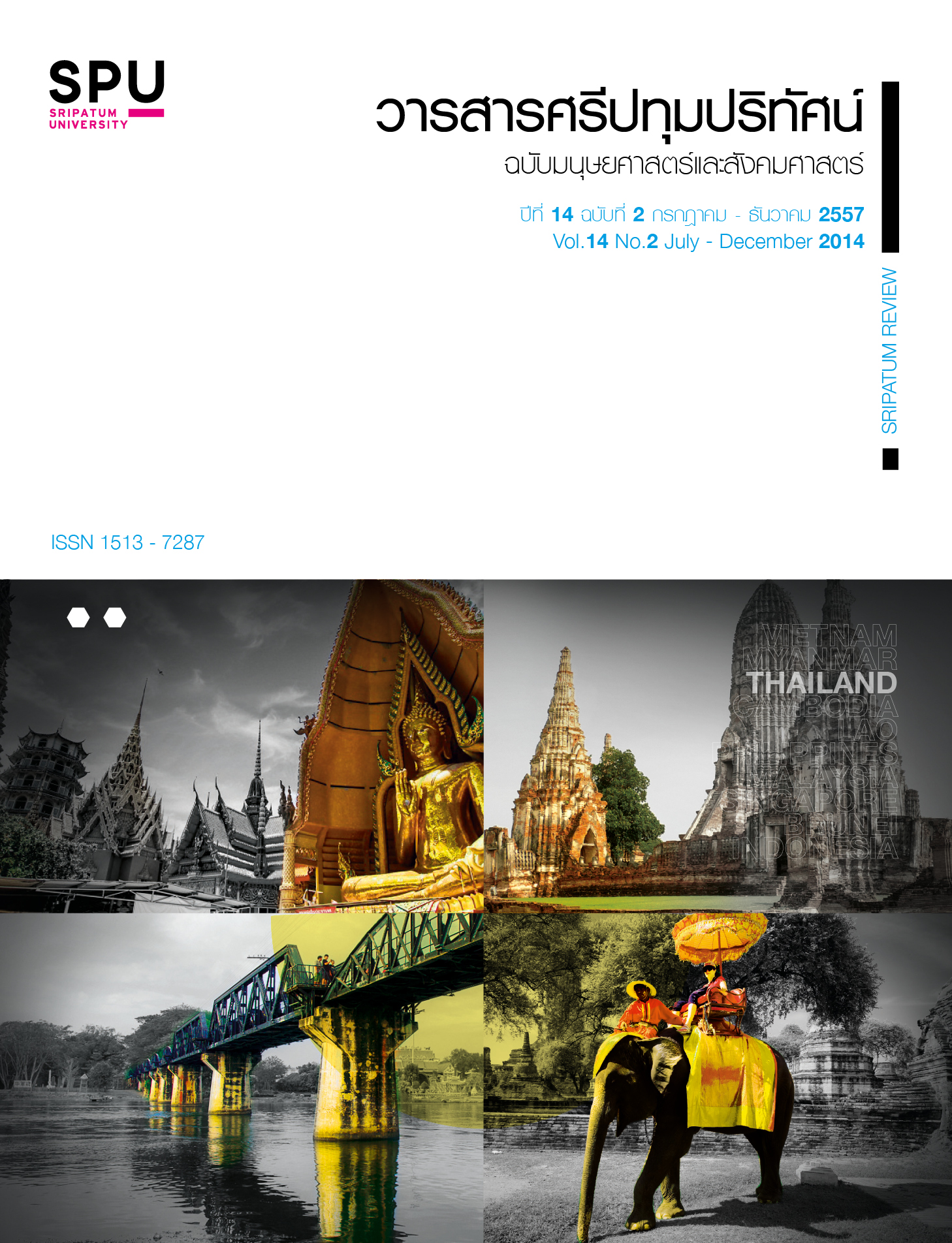A UBIQUITOUS LEARNING-BASED KNOWLEDGE MANAGEMENT MODEL LEADING TOWARDS THE SUCCESS OF OUTSOURCING INFORMATION TECHNOLOGY SUPPORT SERVICE IN ORGANIZATION
Main Article Content
Abstract
The purposes of this research were (1) to develop an appropriate Ubiquitous Learning-Based Knowledge Management Model (uLearnKM Model) for organizations that use the strategy of outsourcing information technology support system; and (2) to study the results of trying out the uLearnKM Model in organization.
The experimental group for the try-out consisted of 40 workers in the employer and employee companies engaging in CUTE (Common Use Terminal Equipment) outsourcing project at Suvarnabhumi Airport. The research process was divided into three phases: (1) the preparation phase which included activities on studying, analysis and synthesis of related research studies and analysis of the context for development of the uLearnKM Model; (2) the development and try-out phase which included development of activities and information system in support of the knowledge management process in accordance with the uLearnKM Model, and the trying out of the Model; and (3) the evaluation phase in order to assess the success of application of the Model by measuring the service provision level, the amount of shared knowledge, the amount of explicit knowledge, and the opinions of the experimental group members concerning the suitability of implementing the process of the Model together with the normal work performance process.
The research findings showed that (1) the developed uLearnKM Model received approval from the experts at the highest level (overall approval mean = 4.63 out of 5); the Model was composed of 19 components in three main dimensions: key success factors in knowledge management, knowledge management process, and Ubiquitous learning; and (2) the results of trying out the developed uLearnKM Model in organization indicated that the Model’s knowledge management process was appropriate at the high level; the created explicit knowledge could be utilized to benefit the organization; and the outsourcer’s service quality level could still meet the organizational requirements.
Article Details
1. กองบรรณาธิการสงวนสิทธิ์ในการพิจารณาและตัดสินการตีพิมพ์บทความในวารสาร
2. บทความทุกเรื่องจะได้รับการตรวจสอบทางวิชาการโดยผู้ทรงคุณวุฒิ แต่ข้อความและเนื้อหาในบทความที่ตีพิมพ์เป็นความรับผิดชอบของผู้เขียนแต่เพียงผู้เดียว มิใช่ความคิดเห็นและความรับผิดชอบของมหาวิทยาลัยศรีปทุม
3. การคัดลอกอ้างอิงต้องดำเนินการตามการปฏิบัติในหมู่นักวิชาการโดยทั่วไป และสอดคล้องกับกฎหมายที่เกี่ยวข้อง
References
ณัฐพล รำไพ. 2554. การพัฒนารูปแบบการ จัดการความรู้ผ่านเว็บที่เสริมสร้าง สมรรถนะของนักศึกษาครู. วิทยานิพนธ์ศึกษาศาสตรดุษฎีบัณฑิต สาขาเทคโนโลยีการศึกษา, มหาวิทยาลัยเกษตรศาสตร์.
ประพนธ์ ผาสุขยืด. 2547. การจัดการ ความรู้ฉบับมือใหม่หัดขับ. กรุงเทพมหานคร: สำนักพิมพ์ใยไหม.วุฒิชัย เครื่องถมยา. ม.ป.ป. การจัดหา ภายนอก (Outsourcing) (Online).
สิทธิชัย ลายเสมา และ พัลลภ พิริยะสุรวงศ์. 2555. การ เรียนรู้ร่วมกันในสภาพแวดล้อมการเรียนรู้แบบ u-learning [บทความ]. วารสารวิทยบริการ มหาวิทยาลัยสงขลานครินทร์
วิทยาเขตปัตตานี ปีที่ 23, ฉบับที่ 3 (ก.ย.-ธ.ค. 2555), หน้า 100-107.
สมชาย นําประเสริฐชัย. 2549. เทคโนโลยีกับการจัดการความรู้ (online).
Davenport, Thomas H., and L. Prusak. 1998. Working Knowledge. USA: Harvard Business School Press.
Ismail, Z., H. Hussin, A. Suhaimi, and N.S.A. Karim. 2005. “Knowledge sharing role in IT outsourcing.” Paper presented at the International Conference on Knowledge Management, Putra World Trade Centre (PWTC), Kuala Lumpur, Malaysia.
Junqi, W.,Yumei, L., & Zhibin, L. 2010. Study of instructional design in Ubiquitous Learning. In Second international workshop on education technology and computer science, pp. 518-523.
Lau, A., and E. Tsui. 2009. “Knowledge management perspective on e-learning effectiveness.” Knowledge-Based Systems 22 (4): 324-325.
Nonaka, I.,and H. Takeuchi. 1995. The knowledge creating company: how Japanese companies create the dynamics of innovation. New York: Oxford University Press.
O'Dell, C., and C. Jackson Grayson, Jr. 1998. If Only We Knew What We Know: the Transfer of Internal Knowledge and Best Practice. n.p.: The Free Press.
Ogata, H., C. Yin, M.M. El-Bishouty, and Y. Yano. 2010. “Computer supported ubiquitous learning environment for vocabulary learning.” International Journal of Learning Technology (IJLT) 5 (1): 5-24.
Probst, G., S. Raub, and K. Romhard. 2002. Managing Knowledge: Building blocks for success. 3rd ed.New York: John Wiley & Sons Inc.
Rollett, H. 2003. KNOWLEDGE MANAGEMENT Processes and Technologies. Kluwer Academic Publishers. Boston/Dordrecht/ London.
Saccol, A. Z., M. Kich, E. Schlemmer, N. Reinhard, J. L. V. Barbosa, and R. Hahn. 2009. “A Framework for the Design of Ubiquitous Learning Applications.” Proceedings of the 42nd Hawaii International Conference on System Sciences 42: 1–10.
Sung, Joung-Souk. 2009. “U-Learning Model Design Based on Ubiquitous Environment.” International Journal of Advanced Science and Technology 13: 77- 88.
Yahya, S., Ahmad, E., & Jalil, K. (2010). “The definition and characteristics of ubiquitous learning: A discussion.” International Journal of Education and Development Using Information and Communication Technology (IJEDICT), 6(1), 117-127.
Yoo, K., H. Kang, and S. Lee. 2007. “An autonomous knowledge acquisition system toward the ubiquitous knowledge management.” International DSI / Asia and Pacific DSI 2007.


